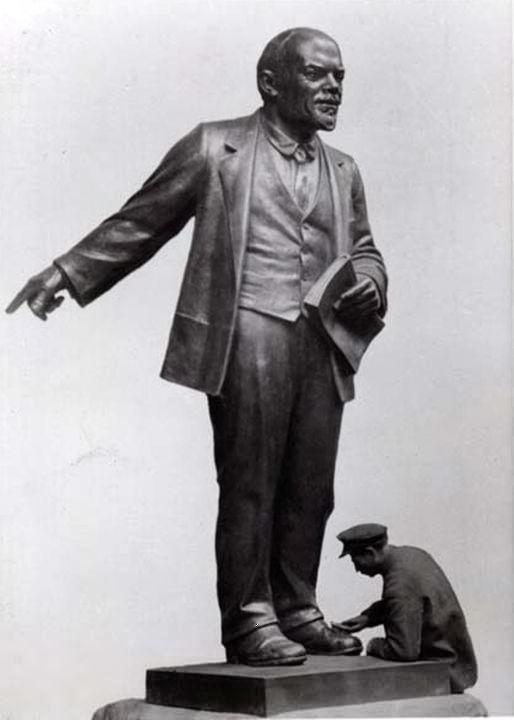(ENG below)
Lenin
Nem kívánom e helyütt a modern politika egyik nagy alakjának életművét részletesen értékelni. Lenin egy radikális szociáldemokrata politikus volt, akit a kapitalizmus addigi legmélyebb válsága tett történelemformáló tényezővé, és aki működésével jelentős mértékben hozzájárult a kapitalista világrendszer fennmaradásához.
Azért, hogy érthető legyen miről beszélek ajánlom elolvasásra „A szovjethatalom soron levő feladatai” című írását. A cikk 1918 áprilisában íródott, tehát amikor már a bolsevik párt volt Oroszország legfontosabb hatalmi tényezője. Pártaktivisták tízezreivel, társadalmi beágyazottsággal, hadsereggel. Megszerezték az állami hatalmat, de még nem dőlt el, mire fogják használni.
Lenin megállapítja, hogy eljutottak a kormányzás feladatához, ezért számba veszi a legfontosabb teendőket. Először is jelentősen emelni kell a szakemberek fizetését, hiszen szakértők nélkül mire menne a gazdaság. Ki kell építeni a termelés és a termékelosztás mindenre kiterjedő állami nyilvántartását és ellenőrzését, továbbá emelni kell a munka termelékenységét. Lenin egyértelművé teszi, hogy a forradalmi diktatúra egyes konkrét személyek teljhatalmát jelenti, semmi mást. Tehát a lenini program: totális állami felügyelet mellett folytatott árutermelés. Annyiban volt modern politikus, hogy ezt a teljes mértékben kapitalista programot a nép érdekeire hivatkozva kívánta megvalósítani – korábban nem volt szokás hogy a politika a nép érdekeit emlegesse, azóta viszont többé-kevésbé kötelező.
Lenin egy jól működő, hatékony árutermelő rendszerről álmodott, vagyis szociáldemokrata volt, de annyiban radikális szocdem, hogy mindezt egy politikai csoport –egy párt- által teljes mértékben kontrollált politikai rendszerben képzelte el.
A kommunista program ezzel szemben teljesen más: az árutermelés felszámolása, a tulajdon és a csere megszüntetése, és természetesen az állam azonnali lebontása (szétverése). A gazdaság és a gazdasági kényszer –ami nem más, mint a profittermelés- helyett az emberi közösség szükségleteinek kielégítése. Állami kényszer helyett önigazgató közösségek. Új rabság helyett szabadság. Munka helyett emberi tevékenység. Ezek azok a célok, melyek eléréséért 1917-ben Oroszországban harcba indultak a proletárok. Hosszú évekre és tömegmészárlásokra volt szüksége a kapitalizmusnak, hogy helyreállítsa az árutermelés rendjét.
Ebben a folyamatban Lenin a történelmi kizsákmányoló osztály élharcosa volt. 1918-ban kertelés nélkül kimondta, mit vár el a néptől: munkafegyelmet és ellentmondás nélküli engedelmeskedést.
—
Lenin
I do not wish to evaluate the life and work of one of the great figures of modern politics in detail here. Lenin was a radical social democratic politician, who was made a factor in shaping history by the deepest crisis of capitalism up to that time, and who, with his work, significantly contributed to the survival of the capitalist world system.
In order to understand what I am talking about, I recommend reading his article entitled “The Immediate Tasks of the Soviet Government”. The article was written in April 1918, when the Bolshevik Party was already the most important power factor in Russia. With tens of thousands of party activists, social embeddedness, and an army. They had acquired state power, but it had not yet been decided what they would use it for.
Lenin states that they have reached the task of governing, and therefore takes stock of the most important tasks. First of all, the salaries of specialists must be significantly increased, because without specialists, what would the economy be like? It is necessary to develop comprehensive state registration and control of production and product distribution, and to increase the productivity of labor. Lenin makes it clear that revolutionary dictatorship means the full power of certain specific individuals, nothing more. So the Leninist program: commodity production under total state supervision. He was a modern politician in that he wanted to implement this completely capitalist program by referring to the interests of the people – previously it was not customary for politics to mention the interests of the people, but since then it has been more or less mandatory.
Lenin dreamed of a well-functioning, efficient commodity production system, that is, he was a social democrat, but a radical social democrat in that he imagined all this in a political system fully controlled by a political group – a party.
The communist program, on the other hand, is completely different: the elimination of commodity production, the abolition of property and exchange, and of course the immediate dismantling (destruction) of the state. Instead of economy and economic coercion – which is nothing more than profit-making –, the satisfaction of the needs of the community. Instead of state coercion, self-governing communities. Instead of new slavery, freedom. Instead of work, human activity. These are the goals that the proletariat in Russia fought to achieve in 1917. It took capitalism many years and mass slaughters to restore the order of commodity production. In this process, Lenin was the vanguard of the historical exploiting class. In 1918, he stated without hesitation what he expected from the people: work discipline and unquestioning obedience.
